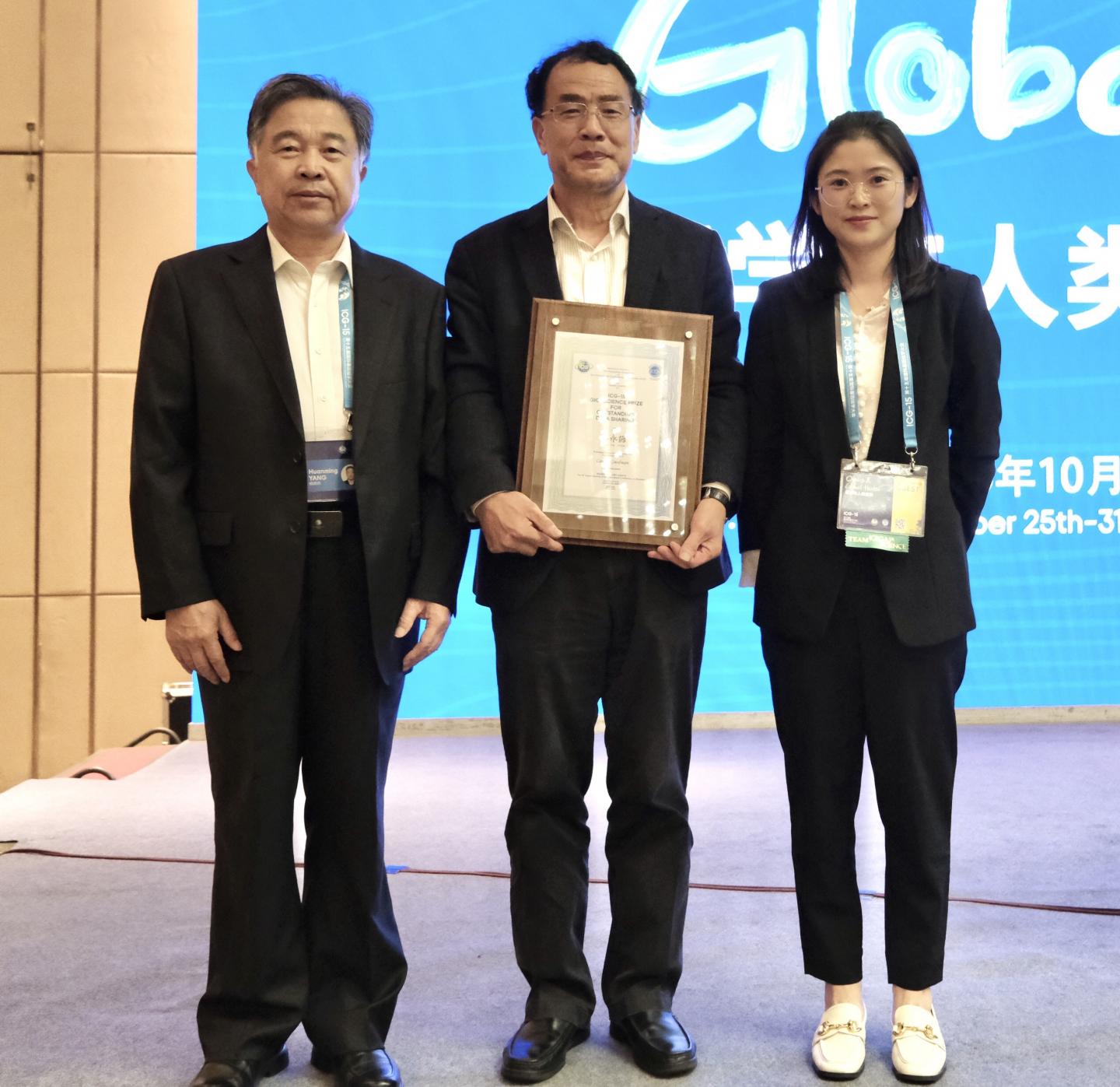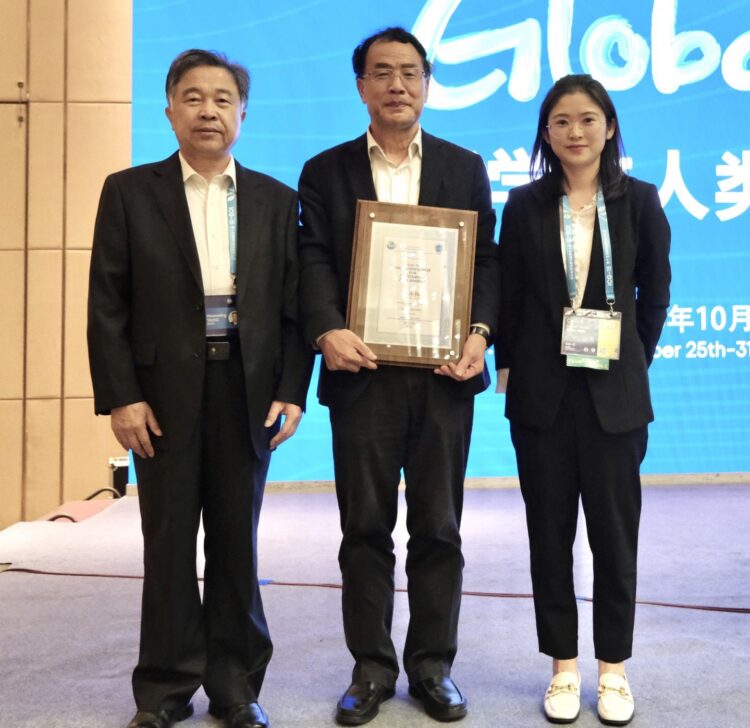Prof Zhang Yongzhen wins the 2020 ICG-15 GigaScience Prize for Outstanding Data Sharing during the COVID-19 pandemic

Credit: None
The international journal GigaScience and ICG-15 presented Professor Zhang Yongzhen with the 3rd GigaScience Award for Data Sharing in Wuhan, Oct 26,2020. The award was for Dr. Zhang’s outstanding efforts in sharing the first whole genome sequence of the deadly COVID-19 virus on January 5th, 2020. While immediate sharing of genetic data from an incredibly dangerous, very infectious virus might seem the obvious thing to do: scientist’s ability to get funding and career advancement has, for decades, been predicated on who is first to publish — not on who is first to help people.
GigaScience has given only 2 awards in the past to individuals who stand as examples for those promoting best open science practices in a variety of areas. This year’s prize focussed specifically on data sharing, as the COVID-19 pandemic has highlighted more than ever the importance of open and international collaborative research.
Given GigaScience journal’s aims to incentivize data sharing and open science practices, Professor Zhang was a clear winner for this year’s award. He not only immediately submitted the SARS-CoV-2 genome data on Jan 5th to the international database, GenBank, but on seeing there was a delay in processing his lab’s submission, he took the extra step to expedite its release to the public by making it available via the virological.org discussion forum.
GigaScience Prize Judge Professor Lachlan Coin from the University of Melbourne highlighted how Prof Zhang’s actions assisted Coin’s own country: “This allowed public health authorities to identify the first case in Australia only 15 days after the genome sequence was uploaded, and is central to ongoing testing efforts which have helped contain the outbreak in our country”.
Professor Nick Loman at the University of Birmingham who is part of the COVID-19 Genomics UK Consortium said: “Every single day of delay can be measured in lives during a pandemic and so Zhang Yongzhen’s early and principled data sharing was a transformative first step in the scientific fight against COVID-19.”
Professor Zhang’s efforts in sharing the first SARS-Cov-2 genome has already been acknowledged around the world, with Time Magazine recognizing him as a “saving grace” and naming him as one of the 100 most influential people of 2020. Stating that: “The Zhang team’s unprecedented speed in sharing data envisions what is possible with a collaborative, connected public-health collective.”
Professor Loman further highlighted the need for sequence data as the only means to get started on truly managing a viral outbreak, saying: “Whilst the generation of a new viral sequence is a technical accomplishment in itself, much more important is the speed of sharing: until this happens the global scientific community cannot get started on a response. The process of designing diagnostic PCR assays and sequencing protocols are critically contingent on that first genome sequence.”
Professor Coin further pointed to how essential having a viral sequence available is to the medical profession, noting: “Early availability of the genome sequence also enabled researchers to start developing vaccines and antiviral therapies even before the virus could be grown in sufficient quantities in cell culture for it to be studied directly.”
The availability of this data within weeks of the first identified COVID-19 patient undoubtedly saved many lives and will be highlighted for many years to come as the perfect example of why we can see further by standing on the shoulders of giants. The GigaScience prize was an acknowledgement for all of Prof Zhang and his groups efforts and will likely be one of many recognitions to come.
Prof Zhang’s prize talk at ICG-15 was on: When Can We Predict the Emergence of an Infectious Disease like Weather Forecast? Envisioning a time when, much like a weather forecast can warn people of an oncoming tornado or typhoon, the immediate availability of an infectious agent’s genome will be able to provide clues on the severity and mode of transmission of that agent. In that respect, creating a world-wide infectious disease genetic monitoring system makes obvious sense to give an early warning system to stop or mitigate potential pandemics.
The GigaScience award, a trophy and a $1000 prize, was given to Professor Zhang at the 15th annual International Conference on Genomics in Wuhan on the 26th October 2020. Presenting in the conference, the winners are given a $1000 prize and trophy. Follow GigaScience on social media for more information. The video of the award ceremony is available in youtube: https:/
###
Contacts:
Scott Edmunds, Editor in Chief
GigaScience, BGI Hong Kong
Email: [email protected]
Sharing on social media?
Find GigaScience online on twitter @GigaScience; Facebook https:/
About GigaScience
GigaScience is co-published by GigaScience Press and Oxford University Press. Winner of the 2018 PROSE award for Innovation in Journal Publishing (Multidisciplinary), the journal covers research that uses or produces ‘big data’ from the full spectrum of the biological and biomedical sciences. It also serves as a forum for discussing the difficulties of and unique needs for handling large-scale data from all areas of the life and medical sciences. The journal has a completely novel publication format — one that integrates manuscript publication with complete data hosting, and analyses tool incorporation. To encourage transparent reporting of scientific research as well as enable future access and analyses, it is a requirement of manuscript submission to GigaScience that all supporting data and source code be made available in the GigaScience database, GigaDB, as well as in publicly available repositories. GigaScience will provide users access to associated online tools and workflows, and has integrated a data analysis platform, maximizing the potential utility and re-use of data.
Media Contact
Scott Edmunds
[email protected]





